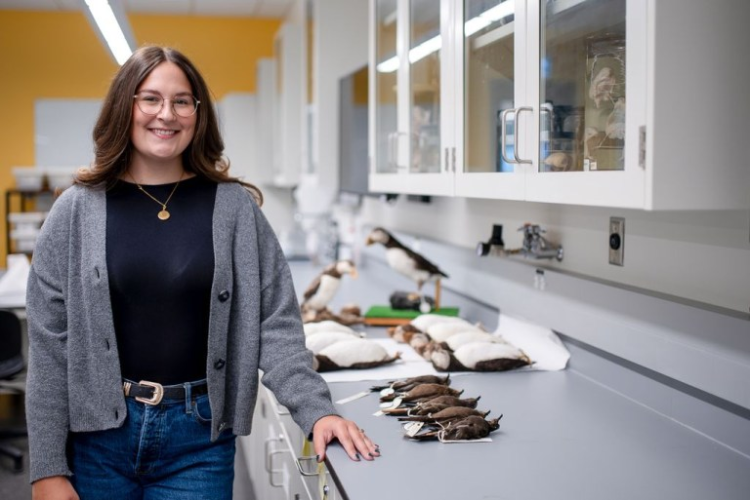New graduate Tori Burt, who completed her master's studies in cognitive and behavioral ecology this fall, has already saved lives in declining seabird populations.

Fall graduate Tori Burt wants to work in wildlife conservation in N.L. or somewhere in Atlantic Canada. Photo: Rich Blenkinsopp
Her research in both her honours project and master of science program helped champion a first-of-its kind study: a multi-sensory investigation of seabirds in Newfoundland and Labrador and other parts of the world.
She will walk across the St. John's Arts and Culture Centre stage during her convocation ceremony on Thursday, Oct. 16, at 10 a.m.
Visual and olfactory cues
Ms. Burt says that her time at Memorial University gave her the unique opportunity to complete fieldwork, including working with Leach's storm-petrels and Atlantic puffins, which was instrumental in her research success.
Her experiences have been profiled on programs like Land and Sea and her research paper, Reduction of Coastal Lighting Decreases Seabird Strandings, is widely cited.
Originally from Bishop's Falls, N.L., Ms. Burt first discovered animal behaviour in the third year of her psychology undergraduate degree.
With help from her supervisor, Dr. William Montevecchi, she excelled in her honours project, which focused on saving seabirds by simply turning out lights along the coast.
"Tori has a great user-friendly personality and is quick to lend her knowledge and to volunteer to help others." Dr. William Montevecchi
Her research primarily involves working with the declining Atlantic population of Leach's storm-petrels and investigating some of the visual and olfactory sensory cues that could be attracting the birds to coastal communities, causing them to strand on land.
While completing her master of science degree, she led a precedent-setting "lights off" experiment involving the largest seafood processing plant in Canada, located on the coast of Bay de Verde, near Baccalieu Island.
"Knowing that such a simple action can possibly save hundreds of storm-petrels is so incredible and I'm grateful for the opportunity to share this information with others so they can be part of the solution, as well," she said.
She has another claim to fame: her research helped shed light on the effects of hurricanes on seabirds in Newfoundland and Labrador.
Memorial connections
Making long-lasting connections is something Ms. Burt says she has noted about her time at Memorial.
"I met several friends who changed my life and will continue to be a part of it forever," she said.
She also met collaborators and mentors who supported her research.
From Dr. Montevecchi: "Tori has a great user-friendly personality, and is quick to lend her knowledge and to volunteer to help others."
Future plans
Ms. Burt has big plans for her future, which include saving even more lives.
"I plan to continue my work in wildlife conservation by getting a job in Newfoundland or in Atlantic Canada."
She's also looking forward to the opportunity to work with other bird species, such as shorebirds or passerines, and plans to become a better birder so she can finally identify sparrows.









